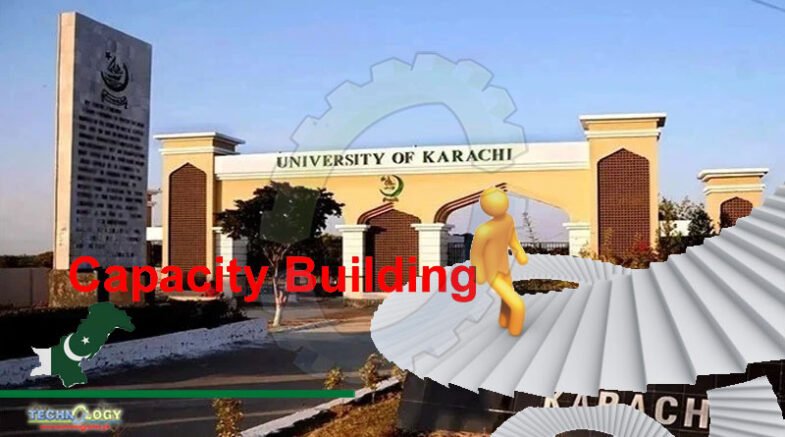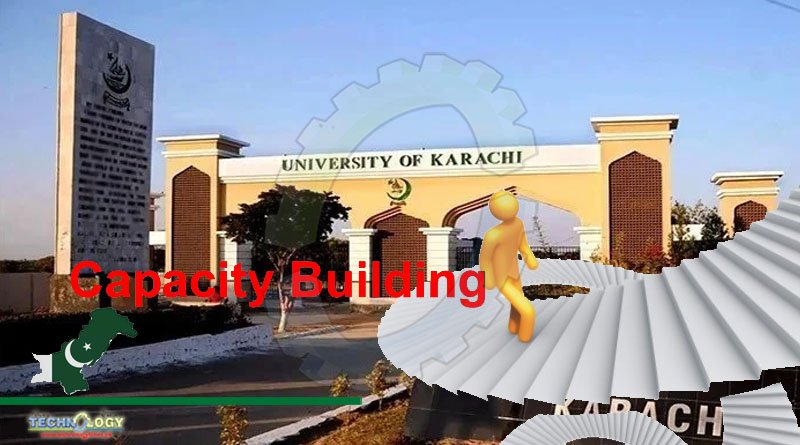The University of Karachi, in collaboration with George Mason University USA, provided capacity building training to 330 faculty members of 14 different universities across the country.

The University of Karachi, in collaboration with George Mason University USA, provided capacity building training to 330 faculty members of 14 different universities across the country to bring significant changes in the social sciences syllabus of the country’s higher education institutions.
The Capacity building Training aimed to develop a complete course structure for the capacity building of faculty under the broad academic domain of social sciences, including arts, humanities, management, and administrative sciences at the undergraduate level.
The vice chancellors and representatives of the 14 partner universities met KU VC Professor Dr Khalid Mahmood Iraqi at the VC Secretariat here on Wednesday and discussed how to implement the sustainable curriculum development project (SCDP) in their respective universities, the possible outcomes of the SCDP, and its impact on the local market and society, said a statement.
The toolkits of the SCDP were also distributed among the 14 partner universities.
The KU and GMU under the University Partnerships Grants Program 2020-23 which was funded by the US Mission in Pakistan and administrated by United States Educational Foundation in Pakistan had launched ‘Sustainable Curriculum Development’ under the project ‘Expanding Career Opportunities for Young Students through Sustainable Curriculum Design’ earlier this year.
Under this project, 330 faculty members of 14 partner universities were trained in their respective campuses within a short span of 45 days.
The capacity building training focused on the conversion of the quality curriculum into a sustainable quality curriculum that includes social, economic, political, and technical integration to ensure that the final degree remains relevant to the local academic scenario and is also recognized worldwide.
The faculty members of the KU Department of Public Administration Dr Mustafa Hyder and Dr Tehmina Faisal along with their team have trained the faculty members of these universities across Pakistan.
Project Lead and Master trainer Dr Mustafa urged for investment in faculty development, updating teaching and evaluation methodology along with a sustainable quality curriculum.
Meanwhile, Project Co-Principal Investigator Dr Tehmina expressed that the best outcome of the project was the opportunity to connect with learned and envisioned individuals of diverse backgrounds, and establish a national forum of equipped faculty members across Pakistan.
On this occasion, the Program Officer US Pakistan University Partnerships Grants Program, USEFP Shahram Niazi informed the participants about the role of USEFP in promoting education in the country and how it helped the faculty and students get PhD, post-doc degrees, and assisted them in getting research grants.
He shared that the SCDP was designed to improve the syllabus in Pakistani universities and how it would help in bringing quality to the higher education sector and how it would link Pakistani universities with the US universities.
“It is very important to change and adapt the curriculum from time to time keeping in mind the needs of industries, market, and society so that the graduating students get more chances and opportunities of employment“, he added.
Shahram Niazi urged that the curriculum should be designed in the sense that students should not face any kind of difficulty in obtaining jobs and could play a positive role as useful citizens for the betterment of society.
Meanwhile, the KU VC Professor Dr Khalid Iraqi shared that in the west and other countries, universities made necessary changes as per the needs and requirements of the market and industry and that was why their graduates were able to perform every kind of task. “Unfortunately in Pakistan, we are unable to do so due to which we are lagging behind in all spheres of life and especially in the invention, innovation, and creativity”, he said.
He mentioned that due to this the young generation also faced difficulty in getting jobs in higher positions within the country and in the international market.
He stressed that for strong collaboration between industries and universities, it was imperative to develop a sustainable curriculum keeping in mind the needs of the market.
“There is no lack of intelligence and creative thinking among our youth, but it is necessary to establish a sustainable curriculum to implement their creative thinking and creations and to promote innovation and new research.” The representatives of the partner universities, while lauding the role of the KU and its trainers, shared that with the SCDP they would be able to meet the challenges of the local and international market very soon.
Later, they visited different departments of the KU and attended the opening ceremony of the two-day long conference at the Multipurpose Hall ICCBS, KU.
The partner universities are Bahria University Karachi, BBSU Lyari Karachi, COMSATS University Islamabad Lahore Campus, Fatima Jinnah Women University Rawalpindi, Government College Women University Sialkot, Jinnah University for Women Karachi, Karaqarum International University, Lasbela University Uthal Baluchistan, Allama Iqbal Open University Islamabad, University of Baluchistan, University of Azad Jammu and Kashmir Muzaffarabad, University of Sindh Jamshoro, Abbottabad University of Science and Technology, Women University Mardan.
Originally published at Urdu Point
